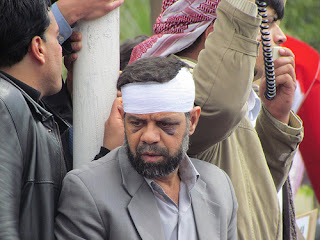Syrians took to the streets this past Friday, April 23, on what was incidentally Good Friday for Christians. According to The Los Angeles Times, at least 101 people were killed among the tens to possibly hundreds of thousands of protestors on what they dubbed “Great Friday.”
Obama has already issued a statement saying that “This outrageous use of violence to quell protests must come to an end now,” and also accusing the Syrian administration of asking Iran, with whom the country has a strategic alliance, for help in the crackdown. Likewise, UN Secretary-General Ban Ki-Moon has demanded an independent investigation into the violence, while France is “extremely concerned.”
Photo Courtesy of shamsnn
Clearly, protesters are not letting the violence and danger stop them.
President Bashar Assad and his lackeys have taken to employing particularly cruel and disturbing methods for subjugating the citizens this time around. Citizens are guarding morgues in order to stop the government from snatching bodies and thus preventing funerals, which are often just as politically charged as the protests, while videos show men shot in streets, children shot in the head, and security guards both in plainclothes and in uniforms shooting from rooftops on unarmed civilians. Official Syrian news agencies, however, are saying that the security forces used only water cannons and tear gas, and that the army discovered fabricated footage of violence on digital cameras.
Assuming that the Syrian news agencies are lying, this use of live fire is particularly disturbing, especially as numerous protesters have attested to the victims being completely unarmed; sadly, many protesters are mostly asking for civil rights, including the right to protest peacefully. As the crackdowns have become harsher in the previous weeks, however, protesters’ demands have become more specific; rather than asking simply for the removal of the five-decades-old emergency law, they are demanding Assad’s ouster.
Photo Courtesy of shamsnn
Many protesters simply want the right to protest peacefully, though most also want the end of Assad's regime.
Among the other demands listed by the group of activists currently speaking for the protesters is the stipulation of a three-day mourning period for those killed by the violence. Unfortunately, it does not look as if the protesters will even be allowed the chance to mourn at funerals; the security forces yet again fired upon protesters on Saturday, April 23, though this time it was on a funeral procession. Particularly disturbing, witnesses described snipers on roofs aiming at mourners.
Now, the citizens have called for a general strike, and have adopted the slogan, “The people want the overthrow of the regime.”
Photo Courtesy of shamsnn
Protesters are uniting around slogans demanding Assad's ouster.
“Can you hear it?” one witness told a reporter over the phone. “Listen. This is war. The regime has declared a war on the Syrian people.”
Still, Obama has not mentioned any kind of military action or aid in the vein of that provided to the Libyan rebels.
Yet again, it seems that world is faced with the horrible task of deciding when the violence becomes too much, and when a humanitarian crisis becomes such that it demands foreign intervention. Especially as Obama drew so much criticism for his handling of Libya (though, I disagree with those who believe he only intervened in order to save American oil interests), it will be a precarious albeit fascinating situation to watch as countries decide whether to react and how. It looks as if France is already showing interest in helping; given its attempts at leadership in Libya, it seems to be trying to take a bigger role in Middle Eastern politics, which is ironic given its recent ban of religious veils on women.
It is a horrible fact that the world is being given the opportunity to refine its strategies on dealing with Middle Eastern protesters attempting to overthrow a repressive regime. Nevertheless, we can only hope for a swifter and less deadly conflict than the one which is currently still raging in Libya. My fingers remain crossed.








